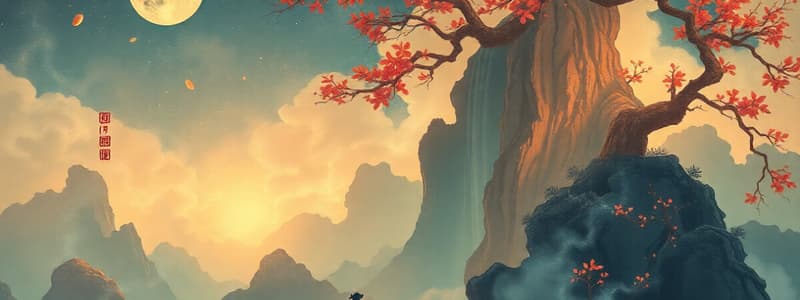Podcast
Questions and Answers
In Li Ch'ing-chao's poem, what is the significance of the phrase 'green may be thriving, the red must be thin now'?
In Li Ch'ing-chao's poem, what is the significance of the phrase 'green may be thriving, the red must be thin now'?
- It reflects the poet's acceptance of the changing seasons.
- It represents the poet's keen observation of nature's subtle transformations and a sense of loss or fading beauty. (correct)
- It signifies the abundance of nature's beauty.
- It indicates the equal growth of green and red elements in the garden.
How does the poet's question to the person rolling up the screens, 'Do you know it?' contribute to the overall meaning of the poem?
How does the poet's question to the person rolling up the screens, 'Do you know it?' contribute to the overall meaning of the poem?
- It shows the poet's concern for the servant's well-being.
- It tests the knowledge of the person rolling up the screens.
- It emphasizes the poet's desire for external validation of her own perception of the seasonal change and fading beauty. (correct)
- It highlights the poet's disinterest in nature.
In the poem, what is the most likely reason for the narrator to repeatedly ask 'Do you know it?' regarding the state of the apple tree?
In the poem, what is the most likely reason for the narrator to repeatedly ask 'Do you know it?' regarding the state of the apple tree?
- The narrator is hard of hearing and needs the response repeated.
- The narrator doubts the person understands the depth of the changes occurring or the underlying sense of loss. (correct)
- The narrator is testing the person's botanical knowledge.
- The narrator suspects the person is lying about the tree's condition.
What is the effect of the wine in the poem?
What is the effect of the wine in the poem?
How does the imagery of 'thin rain, gusty wind' contribute to the mood of the poem?
How does the imagery of 'thin rain, gusty wind' contribute to the mood of the poem?
What is the significance of the speaker mentioning a 'wine hangover' in relation to the changing seasons?
What is the significance of the speaker mentioning a 'wine hangover' in relation to the changing seasons?
What can be inferred from the speaker's act of questioning 'one that raised the curtain' or 'her who rolled up the screens'?
What can be inferred from the speaker's act of questioning 'one that raised the curtain' or 'her who rolled up the screens'?
What is the most likely significance of contrasting the 'crab apple' being 'just as it was' against the implied change in nature?
What is the most likely significance of contrasting the 'crab apple' being 'just as it was' against the implied change in nature?
What does the final declaration 'The leaves should be lush and the petals frail' suggest about the speaker's understanding of nature?
What does the final declaration 'The leaves should be lush and the petals frail' suggest about the speaker's understanding of nature?
How does the translation of 'Last night rain in light rain and gusty wind' relate to the poem's themes?
How does the translation of 'Last night rain in light rain and gusty wind' relate to the poem's themes?
What is the significance of referring to the apple tree or crab apple in the poem?
What is the significance of referring to the apple tree or crab apple in the poem?
Taken as a whole, what is the central theme in Li Ch'ing-chao's poem?
Taken as a whole, what is the central theme in Li Ch'ing-chao's poem?
Which statement best encapsulates the speaker's emotional state throughout the poem?
Which statement best encapsulates the speaker's emotional state throughout the poem?
Why might the speaker be 'no merrier' despite having slept?
Why might the speaker be 'no merrier' despite having slept?
What does the repeated use of 'still' imply in the poem?
What does the repeated use of 'still' imply in the poem?
What literary device is most evident in the contrast between the 'green' and 'red' imagery within the poem??
What literary device is most evident in the contrast between the 'green' and 'red' imagery within the poem??
What assumption underlies the question pertaining to whether someone 'knows' about the state of things?
What assumption underlies the question pertaining to whether someone 'knows' about the state of things?
In comparing the different translations, what is the most compelling reason for including multiple translations of the poem?
In comparing the different translations, what is the most compelling reason for including multiple translations of the poem?
What literary purpose does the rhetorical question, 'Are you blind?' serve within the context of the poem?
What literary purpose does the rhetorical question, 'Are you blind?' serve within the context of the poem?
If the poem is an allegory, what might the changing seasons represent?
If the poem is an allegory, what might the changing seasons represent?
Flashcards
Li Ch'ing-chao
Li Ch'ing-chao
A Chinese poet of the Song Dynasty known for her delicate and poignant verse.
Ci (Lyric)
Ci (Lyric)
A poetic form in Chinese literature, often expressing emotions related to nature, love, or longing.
To the Tune "Like a Dream"
To the Tune "Like a Dream"
The title of a poem by Li Ch'ing-chao, capturing feelings of wine and nature.
Green may be thriving, the red must be thin now
Green may be thriving, the red must be thin now
Signup and view all the flashcards
I try to ask her who rolls up the screens.
I try to ask her who rolls up the screens.
Signup and view all the flashcards
John Turner
John Turner
Signup and view all the flashcards
Study Notes
- Li Ch'ing-chao wrote "To the Tune 'Like a Dream'
The Poem
- The poem describes a scene after a night of light rain and gusty wind
- The speaker’s sleep is not enough to dispel the effects of wine
- The speaker asks someone who rolls up the screens about the state of the flowers
- The person replies that "The apple tree is still the same."
- The speaker emphasizes the ignorance of the person they asked
- The speaker believes that the green foliage should be thriving, while the red blossoms would be thinning now.
Poem Analysis
- In "Last night in light rain and gusty wind," the speaker is affected by the weather and wine.
- The speaker seeks to confirm the changes in the scenery by asking whoever is rolling up the screens.
- The speaker believes that the green (leaves) would be thriving while the red (flowers) would be fading, implying a seasonal change.
Alternate Translations
- Kai-yu Hsu translates the poem under the title "Madrigal: 'As in a Dream'."
- Hsu's translation emphasizes the rough winds and the speaker's lack of cheerfulness despite sleep.
- Hsu's version specifies "wild quince trees" in the reply about the state of the flowers.
- John Turner also translated the poem, with a similar interpretation.
- Willis Barnstone & Sun Chu-chin offer another translation of the poem.
- Eugene Eoyang also provides a translation of the poem.
- Barnstone & Chu-chin's translation refers to "geraniums" instead of apple or quince trees.
- The speaker asks the maid rolling up the blinds- but she replies: "The crab apple is just as it was."
- The final lines emphasize the expected contrast between lush leaves and frail petals.
Studying That Suits You
Use AI to generate personalized quizzes and flashcards to suit your learning preferences.




